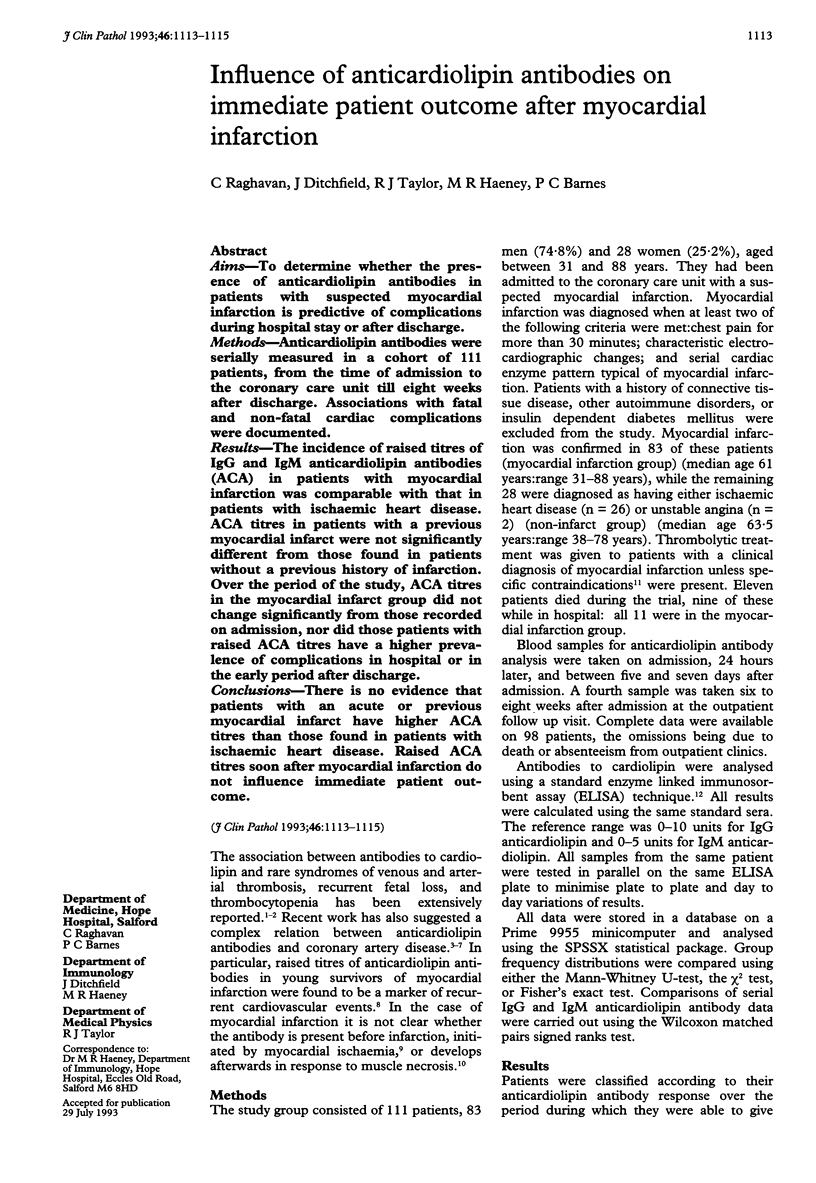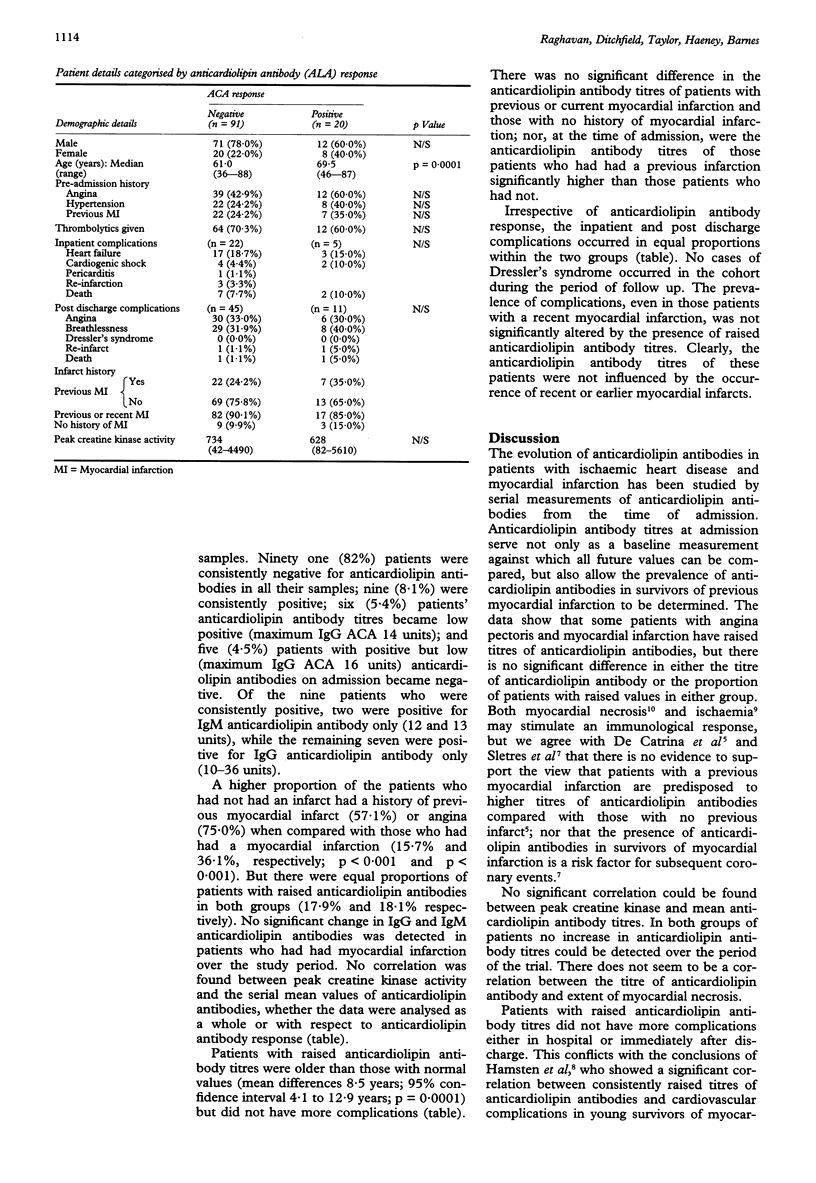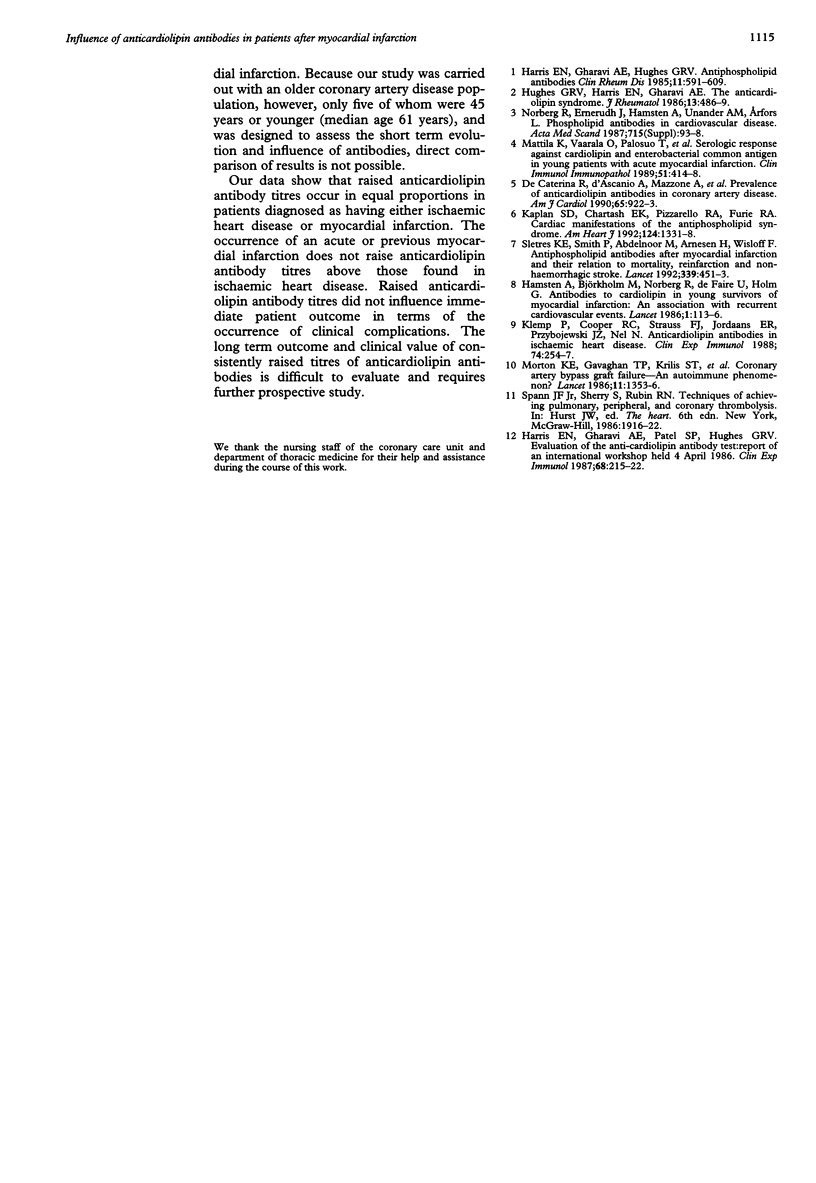Abstract
AIMS--To determine whether the presence of anticardiolipin antibodies in patients with suspected myocardial infarction is predictive of complications during hospital stay or after discharge. METHODS--Anticardiolipin antibodies were serially measured in a cohort of 111 patients, from the time of admission to the coronary care until till eight weeks after discharge. Associations with fatal and non-fatal cardiac complications were documented. RESULTS--The incidence of raised titres of IgG and IgM anticardiolipin antibodies (ACA) in patients with myocardial infarction was comparable with that in patients with ischaemic heart disease. ACA titres in patients with a previous myocardial infarct were not significantly different from those found in patients without a previous history of infarction. Over the period of the study, ACA titres in the myocardial infarct group did not change significantly from those recorded on admission, nor did those patients with raised ACA titres have a higher prevalence of complications in hospital or in the early period after discharge. CONCLUSIONS--There is no evidence that patients with an acute or previous myocardial infarct have higher ACA titres than those found in patients with ischaemic heart disease. Raised ACA titres soon after myocardial infarction do not influence immediate patient outcome.
Full text
PDF


Selected References
These references are in PubMed. This may not be the complete list of references from this article.
- De Caterina R., d'Ascanio A., Mazzone A., Gazzetti P., Bernini W., Neri R., Bombardieri S. Prevalence of anticardiolipin antibodies in coronary artery disease. Am J Cardiol. 1990 Apr 1;65(13):922–923. doi: 10.1016/0002-9149(90)91439-d. [DOI] [PubMed] [Google Scholar]
- Harris E. N., Gharavi A. E., Hughes G. R. Anti-phospholipid antibodies. Clin Rheum Dis. 1985 Dec;11(3):591–609. [PubMed] [Google Scholar]
- Harris E. N., Gharavi A. E., Patel S. P., Hughes G. R. Evaluation of the anti-cardiolipin antibody test: report of an international workshop held 4 April 1986. Clin Exp Immunol. 1987 Apr;68(1):215–222. [PMC free article] [PubMed] [Google Scholar]
- Hughes G. R., Harris N. N., Gharavi A. E. The anticardiolipin syndrome. J Rheumatol. 1986 Jun;13(3):486–489. [PubMed] [Google Scholar]
- Kaplan S. D., Chartash E. K., Pizzarello R. A., Furie R. A. Cardiac manifestations of the antiphospholipid syndrome. Am Heart J. 1992 Nov;124(5):1331–1338. doi: 10.1016/0002-8703(92)90420-z. [DOI] [PubMed] [Google Scholar]
- Klemp P., Cooper R. C., Strauss F. J., Jordaan E. R., Przybojewski J. Z., Nel N. Anti-cardiolipin antibodies in ischaemic heart disease. Clin Exp Immunol. 1988 Nov;74(2):254–257. [PMC free article] [PubMed] [Google Scholar]
- Mattila K., Vaarala O., Palosuo T., Malkamäki M., Valtonen V., Nieminen M., Aho K. Serologic response against cardiolipin and enterobacterial common antigen in young patients with acute myocardial infarction. Clin Immunol Immunopathol. 1989 Jun;51(3):414–418. doi: 10.1016/0090-1229(89)90039-1. [DOI] [PubMed] [Google Scholar]
- Morton K. E., Gavaghan T. P., Krilis S. A., Daggard G. E., Baron D. W., Hickie J. B., Chesterman C. N. Coronary artery bypass graft failure--an autoimmune phenomenon? Lancet. 1986 Dec 13;2(8520):1353–1357. doi: 10.1016/s0140-6736(86)92004-0. [DOI] [PubMed] [Google Scholar]
- Norberg R., Ernerudh J., Hamsten A., Unander A. M., Arfors L. Phospholipid antibodies in cardiovascular disease. Acta Med Scand Suppl. 1987;715:93–98. doi: 10.1111/j.0954-6820.1987.tb09908.x. [DOI] [PubMed] [Google Scholar]
- Sletnes K. E., Smith P., Abdelnoor M., Arnesen H., Wisløff F. Antiphospholipid antibodies after myocardial infarction and their relation to mortality, reinfarction, and non-haemorrhagic stroke. Lancet. 1992 Feb 22;339(8791):451–453. doi: 10.1016/0140-6736(92)91057-f. [DOI] [PubMed] [Google Scholar]
- Wallenburg H. C., Dekker G. A., Makovitz J. W., Rotmans P. Low-dose aspirin prevents pregnancy-induced hypertension and pre-eclampsia in angiotensin-sensitive primigravidae. Lancet. 1986 Jan 4;1(8471):1–3. doi: 10.1016/s0140-6736(86)91891-x. [DOI] [PubMed] [Google Scholar]



